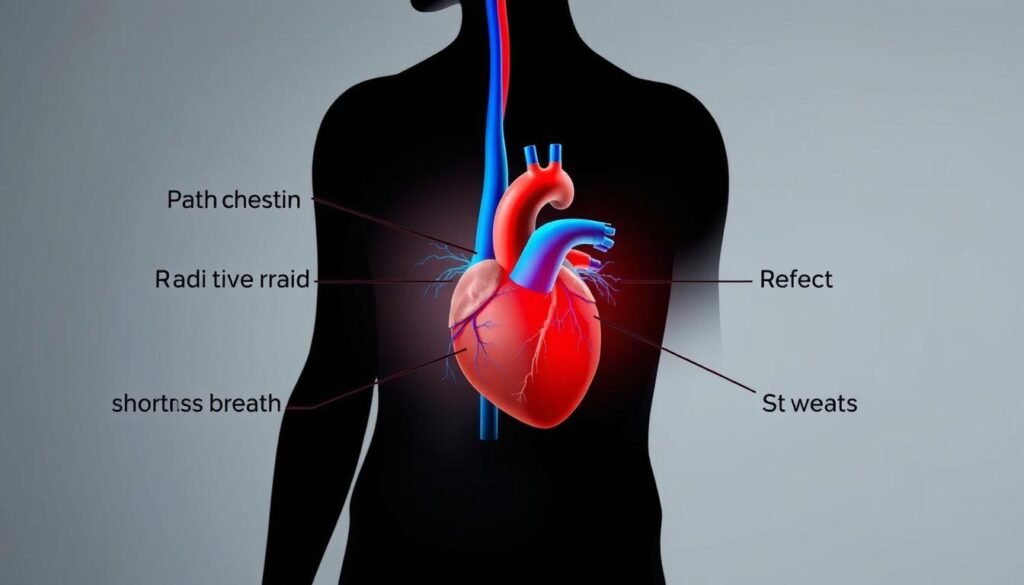Did you know that about 19.1% of U.S. adults face anxiety disorders yearly? This fact presents a big challenge. It’s tough to tell apart anxiety from a heart attack because they look so similar. Panic attacks can last from a few minutes to an hour and often bring chest pain. It’s important to spot the signs and know when to get help.
Dr. Blackburn advises not to ignore symptoms that could signal a heart attack. These symptoms can seem like anxiety, making things confusing and risky. We’ll look at how to spot the differences and when to get urgent medical help.
Key Takeaways
- Anxiety disorders affect nearly 19.1% of adults annually in the U.S.
- Panic attacks can last from several minutes to an hour and often include chest pain.
- Heart attack symptoms may resemble anxiety but can persist or worsen over time.
- Immediate medical attention is crucial if experiencing chest pain for the first time.
- Awareness of atypical symptoms for heart attacks is essential, especially in women.
- Distinguishing between panic attacks and heart attacks can be challenging, even for healthcare providers.
Understanding Anxiety: Causes and Symptoms
Anxiety disorders are a major concern in the United States, affecting about 19.1% of adults every year. Knowing the signs of anxiety is key to get help early. Often, these symptoms start in childhood or adolescence. About 50% of people show signs before they turn 11. It’s also critical to understand why anxiety happens. It could be due to genetics or big stresses in life.
Common Anxiety Symptoms
Anxiety shows up in many ways, both physically and emotionally, including:
- Chest pain
- Heart palpitations
- Shortness of breath
- Trembling or shaking
- Excessive sweating
- Nausea or digestive distress
The physical signs can be scary, making people think they need urgent medical care. But it’s important to know these issues might come from anxiety disorders. A study shows nearly 90% of people feel physical effects from anxiety. Generalized Anxiety Disorder (GAD), for instance, affects about 3.1% of adults. It can make daily life really tough.
The Fight or Flight Response
Our fight or flight reaction is natural when we sense danger. It causes physical changes like faster heartbeat and more adrenaline. These changes get us ready to face threats. But, they can become a problem in normal situations. If stress is always high, this response is too, leading to lasting anxiety and impacting our mental health.
What Is a Heart Attack? Causes and Symptoms
A heart attack happens when the heart muscle gets no blood due to blockages. These blockages are often caused by fat, cholesterol, and other materials that form plaques in the arteries. Recognizing heart attack symptoms quickly is key to avoid lasting heart damage.
Understanding Heart Attack Causes
Heart attacks come from several factors. Key heart attack causes include:
- High cholesterol levels
- Smoking
- High blood pressure
- Diabetes
- Inflammation in the body
It’s critical for people, especially women, to talk to doctors about their risks. Heart disease is a top killer of women. Factors like being overweight and not exercising also play big roles.
Typical Heart Attack Symptoms
Knowing heart attack symptoms can save lives. Some common signs are:
- Chest discomfort or pressure
- Shortness of breath
- Pain or discomfort in the jaw, neck, or back
- Nausea or lightheadedness
- Cold sweat
Women often have different symptoms, like more nausea and breathing problems than men. It’s crucial to know these signs. Not acting fast can lead to big health issues.

| Symptom | Percentage of Men | Percentage of Women |
|---|---|---|
| Chest Pain | 63% | 54% |
| Shortness of Breath | 43% | 56% |
| Nausea | 21% | 30% |
| Pain in Jaw or Back | 36% | 43% |
Knowing all about heart attack symptoms can help people get help fast. This can save lives and prevent worse health problems.
Anxiety vs Heart Attack: Recognizing the Signs
It’s vital to understand the similar symptoms of anxiety and heart attacks. This knowledge is key for correct self-diagnosis and timely help. Both conditions share symptoms, so recognizing them and their emotional triggers is important. This awareness helps people take the right steps based on their symptoms.
Similar Symptoms to Watch For
Chest pain is common in both anxiety and heart attacks, causing confusion. Other symptoms they share include:
- Shortness of breath
- Increased heart rate
- Feelings of impending doom
- Sweating
- Dizziness or lightheadedness
Panic attacks usually last a short time but feel intense. They tend to peak within 5 to 10 minutes and then decrease. On the other hand, heart attack symptoms last longer and may get worse with time.
The Emotional Trigger for Anxiety
Stressful situations often trigger anxiety, leading to panic attacks. Knowing these triggers helps in managing anxiety. Research shows that people with anxiety disorders may have lower heart rate variability. This increases their risk for heart disease. So, regular health check-ups are essential, especially for those with a family history of heart conditions. Recognizing and understanding anxiety symptoms improves overall health outcomes.
Physical Responses: Panic Attack vs Heart Attack
Knowing how to tell apart anxiety and heart issues is key. Understanding these differences helps us react correctly and make the right health decisions. It helps us be more aware and respond better when things get tough.
Chest Pain: Pressure vs Sharp Pain
Chest pain is common in both panic and heart attacks, but it feels different. Heart attacks often cause a tight, pressured pain, like an elephant is sitting on your chest. This pain can spread to your arms, neck, or jaw.
On the flip side, panic attacks give sharp chest pain. This pain usually stays in one spot. It can make you think it’s a heart issue when it’s not.
Duration and Intensity of Symptoms
Panic attacks reach their peak fast, usually within 10 minutes. They often end in 20 to 30 minutes but can last an hour. During this time, your heart rate might shoot up, even over 200 beats per minute.
Heart attack symptoms take time to show up, sometimes hours or days. They can get worse or better but don’t just go away. Around 80% of people with heart attacks feel chest pain strongly. Knowing these physical responses to anxiety versus heart attacks can really help you know what to do in scary moments.

How to Respond When Symptoms Occur
Understanding how to react to symptoms of a panic or heart attack is key. Patients should be watchful, especially when symptoms appear first. Knowing the differences and when to get help is vital.
Quick action is crucial, especially with heart attacks, where symptoms can last over 15 minutes. For panic attacks, learning management techniques offers quick relief during tough times.
When to Seek Immediate Medical Help
If you feel chest pain with nausea, shortness of breath, or fatigue, get medical help. Women in particular may feel sharp pain in their neck, arm, or back. These signs can seem like anxiety but are serious.
Fast help can greatly improve heart attack outcomes. Knowing these signs helps you act fast and prevent complications.
Panic Attack Management Techniques
There are beneficial strategies for those facing panic attacks. Grounding exercises and deep breathing help with panic attack symptoms. A structured approach can also lessen panic attack frequency.
The “3-3-3 rule” helps focus during a panic attack by thinking of things you see, hear, and touch. Eating well and sleeping enough are important for managing anxiety. If you’re unsure about symptoms, the NHS guidelines offer more information and support.

Anxiety Treatment Options: Finding Relief
Many people in the U.S. suffer from anxiety disorders, including panic disorder. This can make daily tasks and mental health a struggle. It’s important to find the right anxiety treatment to take back control. Different strategies work for different people. Help from mental health professionals is key to finding what works best for you.
Effective Anxiety Management Strategies
Good anxiety management can really make life better. Some helpful techniques include:
- Mindfulness and meditation: These help focus your thoughts and lower stress.
- Regular exercise: Working out releases endorphins, which make you feel better.
- Healthy lifestyle choices: Eating well and getting enough sleep are important for your mind.
- Support systems: Spending time with loved ones or support groups provides emotional support.
To learn more about how to deal with anxiety, check out anxiety treatment options.
Therapies for Panic Disorder
Panic disorder mainly starts in early adulthood, impacting around 6 million U.S. adults. Women are more likely to get it, so finding the right therapy is essential. Treatment usually involves both talking therapies and medication. Some common therapies include:
- Exposure therapy: This method gently exposes people to what they fear to lessen panic.
- Cognitive-behavioral therapy (CBT): CBT helps change negative thinking that leads to anxiety.
- Medication: Some medicines like antidepressants and anti-anxiety meds can be helpful.
Therapies for panic disorder need to be personal. Professional help can guide you to the right treatment. Support along the way improves the journey.
Heart Attack Prevention: Staying Healthy
To keep your heart healthy, it’s important to recognize risk factors for heart disease and focus on heart attack prevention. Your lifestyle choices have a big impact on heart health. Remember, heart disease is a top reason people die in the United States.
Identifying Risk Factors for Heart Disease
Knowing the risk factors for heart disease is the first step to better health. High cholesterol, diabetes, and smoking are key concerns. Getting regular health check-ups helps keep an eye on these risks:
- Cholesterol checks should start between ages 9 and 11, followed by every five years.
- Blood pressure must be checked every year if you’re 40 or older.
- Beginning at age 45, type 2 diabetes screenings are recommended, especially if you have more risk factors.
Heart Health Tips for Everyone
Simple changes in your daily life can greatly reduce heart risk. Here are some top tips:
- Exercise moderately for at least 150 minutes every week.
- Keep a healthy weight. Losing just 3% to 5% can improve your health.
- Strive for seven or more hours of sleep nightly for better health.
- Cutting back on alcohol and stopping smoking can have quick health benefits. Your risk drops a lot just one day after you quit smoking.
For more advice on how to prevent a heart attack, you can look at various resources here. Choosing a proactive lifestyle helps you feel better and lowers your chances of heart disease.
Resources for Anxiety and Heart Health
Finding the right support is key, especially when it comes to mental and physical health. They’re closely linked. People seeking help have many options. These include national and local groups that offer advice, education, and a sense of belonging. Using these resources can really help, especially if heart problems are a concern.
Helpful Anxiety Resources
There are many groups focused on anxiety and heart health. Here’s a list of some top resources:
| Organization Name | Focus Area | Contact Information |
|---|---|---|
| Anxiety and Depression Association of America (ADAA) | Anxiety treatment and resources | adaa.org |
| National Institute of Mental Health (NIMH) | Research-based information on anxiety disorders | nimh.nih.gov |
| American Heart Association (AHA) | Heart health support and education | heart.org |
| National Heart, Lung, and Blood Institute (NHLBI) | Heart disease prevention and educational tools | nhlbi.nih.gov |
| 7 Cups | Online emotional support and counseling | 7cups.com |
| BetterHelp | Online therapy for anxiety and mental health | betterhelp.com |
Using these resources for anxiety can empower you. It can help with managing your mental health and supporting heart health. With the right tools and connections, it’s possible to find relief and improve your well-being.
Conclusion
Knowing the difference between anxiety or a heart attack is key for our health and safety. This article showed how hard it can be to tell the symptoms apart. Panic disorder can make this even more complex.
It’s also important to focus on mental health, especially in young people with anxiety disorders. Studies show there might be a link between anxiety and heart disease. Anxiety affects more than just our minds. Being aware and getting the right medical help can improve mental health and protect our hearts.
In the end, taking care of our health is about being informed and alert. Whether dealing with anxiety or worried about heart health, understanding these issues helps us make smart choices. Always seek a doctor’s advice when unsure. Taking quick action could save a life.